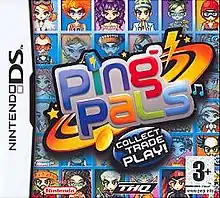| Ping Pals | |
|---|---|
 European packaging artwork | |
| Developer(s) | WayForward Technologies |
| Publisher(s) | THQ |
| Producer(s) | Derek Dutilly |
| Designer(s) | Matt Bozon |
| Programmer(s) | Ian Wakelin |
| Artist(s) | Matt Bozon |
| Writer(s) | Paula Shumard |
| Composer(s) | Shin'en Multimedia (Manfred Linzner, Martin Schioeler) |
| Platform(s) | Nintendo DS |
| Release | |
| Genre(s) | Simulation |
| Mode(s) | Single-player, multiplayer |
Ping Pals is a chat/accessory program developed by WayForward Technologies and published by THQ for the Nintendo DS. It was released on December 8, 2004 in North America & It was released in Europe in early 2005. The program allows the user to customise their "Ping Pal" avatar and game interface by selecting from over 1000 different items such as hairstyles, makeup, clothing, backdrops, music loops and sound effects.
Gameplay
Items can be unlocked by trading with other players or buying them in a shop. Players must trade to complete their collections, as each cartridge's shop offers a different subset of the items. Players receive a regular allowance of coins, using the DS' date-keeping functionality, and can get more by playing mini-games (such as Guess the Number and Hot Potato), typing certain secret words in chat (each word works once per file) and even for choosing to display the credits screen more than once.
Up to 16 players can connect wirelessly using one game cartridge; each must be within about 100 feet (30 m) of one of the others to exchange text and picture messages.
Reception
| Aggregator | Score |
|---|---|
| Metacritic | 28/100[2] |
| Publication | Score |
|---|---|
| 1Up.com | F[3] |
| Electronic Gaming Monthly | 0.5/10[4] |
| GameSpot | 3.3/10[5] |
| GameSpy | |
| GameZone | 3/10[7] |
| IGN | 3.5/10[8] |
| Nintendo Power | 2.8/5[9] |
| Nintendo World Report | 5/10[10] |
| Official Nintendo Magazine | 9%[11] |
| PALGN | 2/10[12] |
Although Ping Pals was marketed as a nonviolent, girl-friendly game, it was frequently criticized as not being interactive enough to be called a game. In addition to this, the DS has a built-in chat program called PictoChat. PictoChat includes features that Ping Pals lacks, and due to this, the game received "generally unfavorable reviews" according to the review aggregation website Metacritic.[2] For instance, Nintendo Official Magazine, in its Nintendo DS special, opened their review of the game by describing its existence as being "a bit like paying money to breathe air." By contrast with other summaries in the magazine, which were typed and more detailed, the reviewer gave a one word summary, handwritten in PictoChat, reading "POINTLESS".[11]
Several images in Ping Pals were licensed from QPlay. These include the Cupimon, a green creature that dances in the startup animation, and several avatar and clothing graphics.
The game received two zeroes and one 1.5 from Electronic Gaming Monthly, the lowest average score in the history of the publication.[4]
See also
References
- ↑ IGN Staff (2004-11-24). "Ping Pals". IGN. Retrieved 2023-06-26.
- 1 2 "Ping Pals for DS Reviews". Metacritic. CBS Interactive. Archived from the original on March 31, 2019. Retrieved October 11, 2019.
- ↑ Maragos, Nich (January 4, 2005). "Ping Pals". 1UP.com. Ziff Davis. Archived from the original on January 5, 2010. Retrieved October 11, 2019.
- 1 2 EGM staff (January 2005). "Ping Pals". Electronic Gaming Monthly. No. 187. Ziff Davis. p. 143.
- ↑ Navarro, Alex (December 15, 2004). "Ping Pals Review [date mislabeled as "December 16, 2004"]". GameSpot. CBS Interactive. Archived from the original on October 11, 2019. Retrieved October 11, 2019.
- ↑ Theobald, Phil (December 17, 2004). "GameSpy: Ping Pals". GameSpy. IGN Entertainment. Archived from the original on October 11, 2019. Retrieved October 11, 2019.
- ↑ Zacarias, Eduardo (December 28, 2004). "Ping Pals - NDS - Review". GameZone. Archived from the original on September 28, 2008. Retrieved October 11, 2019.
- ↑ Harris, Craig (December 14, 2004). "Ping Pals". IGN. Ziff Davis. Archived from the original on October 11, 2019. Retrieved October 11, 2019.
- ↑ "Ping Pals". Nintendo Power. Vol. 188. Nintendo of America. February 2005. p. 115.
- ↑ Metts, Jonathan (December 30, 2004). "Ping Pals". Nintendo World Report. NINWR, LLC. Archived from the original on October 11, 2019. Retrieved October 11, 2019.
- 1 2 "Ping Pals review". Nintendo Official Magazine. Vol. 151. Future plc. March 2005.
- ↑ van Leuveren, Luke (August 27, 2005). "Ping Pals Review". PALGN. Archived from the original on December 29, 2011. Retrieved October 11, 2019.
External links